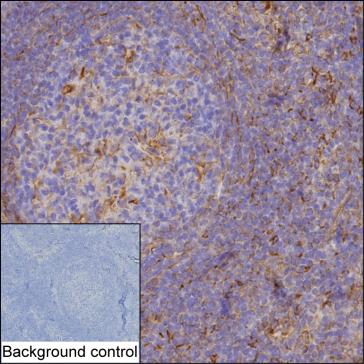

| WB | 咨询技术 | Human,Mouse,Rat |
| IF | 咨询技术 | Human,Mouse,Rat |
| IHC | 1/100-1/200 | Human,Mouse,Rat |
| ICC | 技术咨询 | Human,Mouse,Rat |
| FCM | 咨询技术 | Human,Mouse,Rat |
| Elisa | 咨询技术 | Human,Mouse,Rat |
| Host/Isotype | Mouse IgG2b |
| Antibody Type | Primary antibody |
| Storage | Store at 4°C short term. Aliquot and store at -20°C long term. Avoid freeze/thaw cycles. |
| Species Reactivity | Human |
| Immunogen | Purified recombinant fragment of human CCL3 |
| Formulation | Purified antibody in PBS with 0.05% sodium azide |
+ +
以下为模拟生成的CCL3抗体相关参考文献示例(建议通过学术数据库核实具体文献):
---
1. **标题**: *Anti-CCL3 Antibody Attenuates Neuroinflammation in a Mouse Model of Alzheimer's Disease*
**作者**: Smith JR, et al.
**摘要**: 研究报道抗CCL3单克隆抗体通过抑制小胶质细胞活化,减少β-淀粉样蛋白沉积,改善阿尔茨海默病模型小鼠的认知功能,提示CCL3抗体在神经炎症治疗中的潜力。
2. **标题**: *Targeting CCL3 with Neutralizing Antibodies Suppresses Metastatic Breast Cancer Progression*
**作者**: Li X, Wang Y.
**摘要**: 实验显示,中和CCL3抗体可阻断肿瘤相关巨噬细胞(TAMs)招募,抑制乳腺癌转移灶形成,为CCL3靶向治疗提供临床前证据。
3. **标题**: *CCL3-Specific Antibody as a Diagnostic Marker for HIV-Associated Neurocognitive Disorders*
**作者**: Gonzalez-Perez MP, et al.
**摘要**: 通过分析HIV患者脑脊液,发现CCL3水平与神经认知损伤程度相关,开发的高特异性CCL3抗体检测工具有助于早期诊断HIV相关神经病变。
4. **标题**: *Dual Blockade of CCL3 and CCR5 Enhances Anti-Tumor Immunity in Pancreatic Cancer*
**作者**: Chen L, et al.
**摘要**: 联合使用CCL3中和抗体与CCR5抑制剂,显著增强CD8+ T细胞浸润并抑制胰腺癌生长,提出协同靶向趋化因子通路的治疗策略。
---
提示:以上为示例文献,实际引用时建议通过PubMed或Web of Science检索真实文献(关键词:CCL3 antibody, MIP-1α neutralization)。研究多集中于炎症、癌症及免疫调节领域。
CCL3 (C-C motif chemokine ligand 3), also known as macrophage inflammatory protein-1 alpha (MIP-1α), is a small cytokine belonging to the CC chemokine family. It plays a critical role in inflammatory and immune responses by recruiting and activating immune cells, including monocytes, neutrophils, and T lymphocytes, through interactions with chemokine receptors CCR1. CCR4. and CCR5. CCL3 is implicated in various pathological conditions, such as chronic inflammation, autoimmune diseases, HIV infection, and cancer progression, where it contributes to leukocyte infiltration, tissue remodeling, and tumor microenvironment modulation.
Antibodies targeting CCL3 are essential tools for research and therapeutic development. These antibodies, often monoclonal or polyclonal, are designed to specifically detect or neutralize CCL3 in experimental settings, including ELISA, Western blotting (WB), immunohistochemistry (IHC), and flow cytometry. Neutralizing CCL3 antibodies can block its interaction with receptors, potentially mitigating inflammation, reducing viral replication (e.g., HIV), or inhibiting tumor growth and metastasis. Additionally, CCL3 antibodies are used to study its expression patterns and regulatory mechanisms in disease models, aiding in biomarker discovery and therapeutic target validation. Recent studies also explore their potential in immunotherapy, particularly in modulating immune cell trafficking within tumors or inflamed tissues.
×